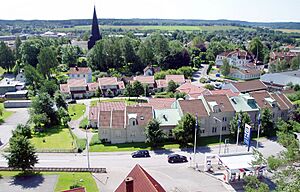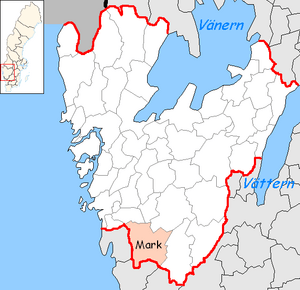Mark Municipality facts for kids
Quick facts for kids
Mark Municipality
Marks kommun
|
||
|---|---|---|

View over Skene (the urban district of Kinna).
|
||
|
||
| Nickname(s):
Tygriket "The Fabric Kingdom"
|
||
 |
||
| Country | ||
| County | Västra Götaland County | |
| Established in | 1971 | |
| Seat | Kinna | |
| Area | ||
| • Total | 1,017.78 km2 (392.97 sq mi) | |
| • Land | 933.71 km2 (360.51 sq mi) | |
| • Water | 84.07 km2 (32.46 sq mi) | |
| Area as of January 1, 2010. | ||
| Population
(June 30, 2012)
|
||
| • Total | 33,829 | |
| • Density | 33.2380/km2 (86.0861/sq mi) | |
| Demonym(s) | Marbo | |
| Time zone | UTC+1 (CET) | |
| • Summer (DST) | UTC+2 (CEST) | |
| Postal code |
43499 -to- 51997
|
|
| Area code(s) | 0320 | |
| ISO 3166 code | SE | |
| Province | Västergötland | |
| Municipal code | 1463 | |
| Website | www.mark.se | |
Mark Municipality (called Marks kommun in Swedish) is a special area in southwest Sweden. It's located in Västra Götaland County. The main town and administrative center is Kinna. Mark Municipality was formed in 1971. It brought together eight smaller areas to create one larger municipality.
Contents
Understanding the Mark Municipality Coat of Arms
The coat of arms for Mark Municipality was made in 1974. The gold and black colors on the shield show strength and stability.
The grain symbol reminds us of the area's farming history. The circles look like four cannonballs. They represent the battles fought between Denmark and Sweden in the Mark area long ago. The weaver's shuttle-tool shows the region's long history of making textiles. Mark is famous for its fabrics all over Sweden.
A Look at Mark Municipality's History
Mark's Medieval Past
The name Mark comes from an old district called Mark Härad. This district existed in the southern part of the region around the 1200s. The word Mark might mean "border" or "edge" in old Swedish. In medieval times, Mark Härad (now Mark Municipality) was right on the border between the Kingdom of Denmark and the Kingdom of Sweden.
Many wars were fought in this region during the Middle Ages. Farmers sometimes find old weapons and remains when they are working in their fields. Many of these old items have been found near Öresten Fortress. This fortress was first built by the Danes. Tyge Puder was the first nobleman known to live there from 1364 to 1386.
The Swedish army took over the fortress in 1470. This happened during the Battle of Öresten, when the Danish king Kristian the First lost to Sten Sture the Elder. The fortress was later destroyed in the early 1500s. Today, Öresten Fortress is a protected historical site that people can visit all year.
In 1682, a place for executions was set up outside Skene village. It was called Galgbacken, meaning "The hill of hanging". In 1934, archaeologists found the buried remains of those who were executed there.
The Industrial Revolution and Textiles
The Mark region was very important for Sweden's textile industry. Since the late 1700s, it has been known as the "Fabric Kingdom". This is because so many people in the area were skilled at making textiles. Many traveling salesmen from Mark sold high-quality fabrics across the country. After the Industrial Revolution, the region became a national center for sewing, dyeing, and making textiles.
Some of the biggest textile factories back then were Kungsfors Textilfabrik in Skene, Fritsla Textilfabrik in Fritsla, and Rydal Textilfabrik in Rydal. By 2014, these factories were no longer in use. However, the old factory in Rydal has been turned into a museum. It tells the story of the region's textile and business history.
Mark in the Modern Era
In 1971, Mark Municipality was created by joining eight smaller municipalities. The name "Mark" was chosen to remember the area's long history.
By the early 1980s, most of the textile factories had closed. Today, only three major textile and dyeing factories remain: Almedahls in Kinna, Ekelund in Horred, and Ludvig Svensson near Kinna.
Mark Municipality still celebrates its textile heritage. The region is known for its special textile knowledge and production. It is home to Sweden's largest makers of fire hoses, bulletproof materials, and filtering equipment.
Getting Around: Roads and Public Transport
Mark Municipality has good connections to major cities in Sweden. You can reach Gothenburg (Sweden's second-largest city) by car or bus in about an hour. Buses and trains leave from stations in Kinna and Skene.
Main Roads in Mark
- Road R156: This road goes west to Gothenburg and east to Svenljunga.
- Road R41: This road goes north to Borås and south to Varberg.
Public Transport Options
The regional company Västtrafik (West traffic) runs all public transport.
- Bus 300 & 430: These buses travel on the West-East route between Gothenburg, Sätila, Skene, and Kinna.
- Bus 450: This bus goes on the Northern route between Skene and Borås.
- Train: Trains run on the Viskadalsbanan line between Varberg and Borås. They stop at Horred, Björketorp, Berghem, Skene, Assberg, Kinna, and Fritsla.
Towns and Villages in Mark Municipality
Major Towns
- Kinna (This is the main town and administrative center)
Minor Towns
- Örby
- Fritsla
Villages
- Berghem
- Björketorp
- Fotskäl
- Haby
- Hajom
- Horred
- Hyssna
- Istorp
- Kinnaström
- Rydal
- Skephult
- Sätila
- Torestorp
- Tostared
- Älekulla
- Öxabäck
International Sister Cities
Mark Municipality has three sister cities. The municipality chose these cities because they also have a history of textile manufacturing.
- Apolda (Germany) - since 1994.
- Szamotuły (Poland) - since 1988. This connection started because of concerns about nuclear power in Szamotuły. They wanted to connect with Swedish cities because Sweden was having discussions about nuclear energy.
- Ontinyent (Spain) - since 2003.
Neighboring Municipalities
Mark Municipality shares borders with these areas:
- To the east: Svenljunga Municipality
- To the north: Bollebyggd Municipality, Borås Municipality, Härryda Municipality
- To the south: Varberg Municipality (in Halland County)
- To the west: Kungsbacka Municipality (in Halland County)
Sports and Fun Activities
Mark Municipality has over 60 major sports and hobby clubs. Here are some of the main ones:
Clubs in Mark
- Fotskäl Hockey Club (Fotskäl / 1972 - Ice hockey)
- Skene IF (Skene / Soccer)
- Skene SoIS (Skene / Swimming, Orienteering, and general athletics)
- Kinna IF (Kinna / 1922 - Soccer and Orienteering)
- Skene Motorsällskap (Skene / 1955 - Rallycross and Motocross)
- Marks Amatörradio Klubb "SK6BA" (Skene / 1991 - Ham radio)
- Marks GK (Kinna / 1962 - Golf)
- Marbo BK (Kinna / 1969 - Basketball)
- Sätila SK (Sätila / 1928 - Football)
See also
 In Spanish: Municipio de Mark (Suecia) para niños
In Spanish: Municipio de Mark (Suecia) para niños
 | Aurelia Browder |
 | Nannie Helen Burroughs |
 | Michelle Alexander |


